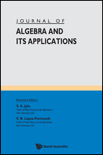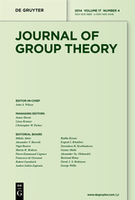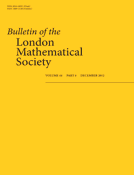
International Journal of Group Theory
Scope & Guideline
Advancing the Frontiers of Algebraic Knowledge
Introduction
Aims and Scopes
- Group Structure and Classification:
The journal emphasizes the study of group structures, including classifications of finite and infinite groups, subgroup lattices, and properties of specific types of groups such as nilpotent and solvable groups. - Applications of Group Theory:
Research exploring the applications of group theory in areas such as cryptography, signal processing, and quantum information is a significant focus, highlighting the practical implications of abstract mathematical concepts. - Graph Theory and Group Interactions:
The intersection of graph theory and group theory is frequently explored, particularly in relation to the representation of groups through graphs, automorphism groups, and the combinatorial properties of groups. - Algebraic Structures and Constructions:
The journal also covers various algebraic constructions associated with groups, including semigroups, braces, and other algebraic entities, emphasizing their structural properties and relationships. - Computational Aspects:
There is a notable focus on computational aspects of group theory, including algorithms for computing group properties, representations, and automorphisms, showcasing the intersection of mathematics and computer science.
Trending and Emerging
- Cryptography and Security:
There is a growing trend towards exploring group-theoretical applications in cryptography, particularly in the design of secure encryption methods, as researchers recognize the importance of group structures in ensuring data security. - Quantum Computing Applications:
Emerging research related to quantum computing and its connections with group theory is on the rise, highlighting the relevance of algebraic structures in understanding quantum phenomena and developing quantum algorithms. - Computational Group Theory:
An increasing number of papers focus on computational methods within group theory, including algorithm development for group computations and automorphisms, reflecting the integration of computational techniques in theoretical research. - Interdisciplinary Approaches:
Themes that bridge group theory with other mathematical disciplines, such as topology, geometry, and combinatorics, are gaining traction, fostering a more collaborative and integrative research environment. - Advanced Algebraic Structures:
Research on advanced algebraic structures related to groups, including semigroups and braces, is becoming more prevalent, indicating a shift towards exploring new frameworks that extend classical group theory.
Declining or Waning
- Historical Perspectives in Group Theory:
There has been a noticeable decrease in papers focusing on historical developments or classical results within group theory, as the community shifts towards more contemporary applications and computational advancements. - Elementary Group Theory:
Research centered on basic or introductory aspects of group theory appears to be less prominent, with fewer publications addressing fundamental definitions or properties, possibly due to a growing expectation for foundational knowledge among researchers. - Purely Theoretical Constructs:
Themes that involve purely theoretical constructs without practical applications seem to be waning, as the journal increasingly emphasizes research that demonstrates the applicability of group theory in real-world contexts. - Generalized Group Properties:
Studies that focus on very generalized or abstract properties of groups without specific applications or connections to other mathematical areas have seen a decline, indicating a preference for more targeted investigations.
Similar Journals

CANADIAN JOURNAL OF MATHEMATICS-JOURNAL CANADIEN DE MATHEMATIQUES
Exploring the frontiers of mathematical research.Canadian Journal of Mathematics - Journal Canadien de Mathématiques is a prestigious peer-reviewed journal published by Cambridge University Press, which aims to advance the field of mathematics through the dissemination of high-quality research articles. With its ISSN 0008-414X and E-ISSN 1496-4279, the journal plays a pivotal role in fostering mathematical research and collaboration. It has been recognized for its impactful contributions, currently holding a category quartile ranking of Q2 in Mathematics (miscellaneous) for 2023 and sits in the 66th percentile among its peers according to Scopus rankings. As the journal continues its convergence from its inception in 1994 through to 2024, it remains a vital resource for researchers, professionals, and students seeking to stay at the forefront of mathematical developments. The journal does not operate under an open access model, allowing for a curated collection of articles that adhere to rigorous academic standards.

JOURNAL OF ALGEBRA AND ITS APPLICATIONS
Advancing Mathematical Knowledge Through Rigorous ResearchJOURNAL OF ALGEBRA AND ITS APPLICATIONS, published by WORLD SCIENTIFIC PUBL CO PTE LTD, stands as a pivotal resource for scholars in the fields of Algebra and Applied Mathematics. With an ISSN of 0219-4988 and E-ISSN 1793-6829, this journal has been providing a forum for the dissemination of cutting-edge research since its inception in 2008, converging towards a forward-looking timeline extending to 2024. As of 2023, it has earned a commendable Q2 ranking in both Algebra and Number Theory, as well as Applied Mathematics, reflecting its solid impact within the mathematical community. With a Scopus rank of #49/119 in Algebra and Number Theory, and #420/635 in Applied Mathematics, the journal captures significant advancements and applications across various mathematical domains. While it does not operate under an open access model, its comprehensive articles and research outputs are crucial for fostering intellectual dialogue and innovation in academia. Researchers, professionals, and students alike will find this journal an indispensable asset for their scientific pursuits and explorations into the vast field of mathematics.

JOURNAL OF GROUP THEORY
Fostering Excellence in Group Theory ScholarshipJOURNAL OF GROUP THEORY, published by Walter de Gruyter GmbH, is a pivotal academic journal that delves into the intricacies of group theory, an essential area within the mathematical landscape, particularly in the fields of algebra and number theory. Established in 1998, this journal has made significant contributions to advancing research and theory until 2024, boasting a respectable Q2 ranking in its category as of 2023, underpinning its relevance among peers. Though it does not currently offer open access options, it remains accessible to a wide audience through institutional subscriptions, making its high-quality research available to universities and research institutions globally. With a current Scopus rank of 78 out of 119 in Mathematics and a 34th percentile standing, the JOURNAL OF GROUP THEORY is a vital resource for researchers, students, and professionals seeking to engage with cutting-edge developments in group theory and its applications. Located in Berlin, Germany, the journal serves as a core platform for disseminating rigorous research and fostering scholarly communication in this dynamic field.

RICERCHE DI MATEMATICA
Celebrating Mathematical Excellence and Global CollaborationRICERCHE DI MATEMATICA, published by SPRINGER-VERLAG ITALIA SRL, is a prominent academic journal situated at the intersection of mathematics and its applications, with an ISSN of 0035-5038 and an E-ISSN of 1827-3491. Based in Italy, this journal serves as a crucial platform for disseminating innovative research findings and theoretical advancements in the diverse fields of applied mathematics and general mathematics, currently ranked in the Q3 quartile as per the 2023 category evaluations. The journal's standing is underlined by its impressive Scopus rankings, securing the 61st position out of 399 in General Mathematics and the 224th in Applied Mathematics, placing it well within the 84th and 64th percentiles respectively. Catering to a global audience of researchers, professionals, and students, RICERCHE DI MATEMATICA not only celebrates mathematical exploration but also enhances understanding through open discourse by fostering connections among scholars from various mathematical disciplines. With a converged publication cycle spanning from 2007 to 2024, the journal is committed to promoting high-quality research that shapes the future of mathematical sciences.

Dissertationes Mathematicae
Advancing Mathematical Frontiers.Dissertationes Mathematicae is a prestigious academic journal published by the Polish Academy of Sciences Institute of Mathematics (IMPan), renowned for its contributions to the field of mathematics since its inception. With an impressive Q1 ranking in the miscellaneous mathematics category for 2023 and positioned at Rank #73 out of 399 in General Mathematics according to Scopus, this journal serves as a pivotal platform for disseminating high-quality research and innovative theoretical developments. Spanning from 2000 to 2024, it focuses on a broad range of mathematical disciplines, encouraging interdisciplinary collaboration and advancing mathematical understanding globally. While it currently does not offer open access, the journal is highly regarded in academic circles and continues to attract submissions from respected researchers and institutions. With a commitment to excellence and a notable impact factor, Dissertationes Mathematicae plays a crucial role in the ongoing development of mathematical theories and applications, making it an essential resource for researchers, professionals, and students alike.

BULLETIN OF THE LONDON MATHEMATICAL SOCIETY
Advancing Mathematical Frontiers Since 1969The BULLETIN OF THE LONDON MATHEMATICAL SOCIETY, published by Wiley, is a distinguished journal that serves as a vital resource in the field of mathematics. With its ISSN 0024-6093 and E-ISSN 1469-2120, this journal has consistently provided a platform for innovative research and scholarly discourse since its inception in 1969. Recognized for its quality, it currently holds an impressive Q1 ranking in the mathematics category, a testament to its significance in disseminating influential findings and trends in the mathematical sciences. Researchers and practitioners can rely on the BULLETIN for its comprehensive coverage of both theoretical and applied mathematics, which caters to a diverse audience ranging from professionals to students alike. Though it does not currently offer Open Access options, its articles can be accessed through institutional subscriptions, ensuring that significant works reach the academic community effectively. With contributions that span over five decades, the journal continues to shape mathematical research and inspire future advancements in the discipline.

RENDICONTI DEL SEMINARIO MATEMATICO DELLA UNIVERSITA DI PADOVA
Advancing mathematical knowledge for a global audience.RENDICONTI DEL SEMINARIO MATEMATICO DELLA UNIVERSITA DI PADOVA, published by the European Mathematical Society, stands as a notable open-access journal with a rich history in disseminating research across various domains of mathematics. With an ISSN of 0041-8994 and E-ISSN 2240-2926, this journal has embraced open access since 2023, significantly enhancing its visibility and accessibility to a global audience. Situated in Germany, its publishing house is based at Technical University Berlin, which emphasizes its academic roots and dedication to fostering mathematical research. The journal features a quartile ranking of Q3 across multiple categories including Algebra and Number Theory, Analysis, Geometry and Topology, and Mathematical Physics as of 2023, indicating a vibrant contribution to the field, despite its challenge in specific rankings. Researchers, professionals, and students alike will find in this journal a platform for innovative ideas and significant findings that are crucial to the evolution of modern mathematics.

TRANSACTIONS OF THE AMERICAN MATHEMATICAL SOCIETY
Unveiling Insights in the Mathematical RealmTRANSACTIONS OF THE AMERICAN MATHEMATICAL SOCIETY, published by the American Mathematical Society, is a premier journal in the field of mathematics that has been contributing to the advancement of mathematical knowledge since 1900. With an ISSN of 0002-9947 and an E-ISSN of 1088-6850, this journal holds a prestigious position in the academic landscape, evidenced by its Q1 rankings in both Applied Mathematics and Miscellaneous Mathematics categories as of 2023. With a Scopus ranking of #97 in General Mathematics and a percentile standing of 75th, the journal is recognized for its rigorous peer-review process and the quality of the research it publishes. Though it does not currently offer open access options, it essentially serves as a vital resource for researchers, professionals, and students seeking critical insights and developments in mathematical theory and applications. The Transactions aim to publish high-quality research articles that foster the exchange and dissemination of ideas, supporting the growth of both theoretical and applied mathematics within the global scholarly community.

Advances in Mathematics of Communications
Exploring New Frontiers in Mathematical SciencesAdvances in Mathematics of Communications, published by the American Institute of Mathematical Sciences (AIMS), is a leading journal dedicated to the dissemination of high-quality research in the fields of algebra, number theory, applied mathematics, discrete mathematics, combinatorics, and computer networks. Established in 2008, this journal has quickly established itself as a significant contributor to mathematical communications, holding a reputable position in the Scopus rankings, with impressive category quartiles, including Q2 rankings in key areas such as Algebra and Number Theory and Applied Mathematics. Besides its rigorous peer-review process, the journal facilitates the growth of innovative ideas and methodologies that bridge the gap between theory and application. With no open access restrictions, Advances in Mathematics of Communications aims to provide an inclusive platform for researchers, professionals, and students to share their findings and insights, fostering collaboration and advancing the global knowledge base in the mathematical sciences. The journal's commitment to excellence ensures its role as an essential resource in the ever-evolving landscape of mathematics.

SIBERIAN MATHEMATICAL JOURNAL
Charting New Territories in Mathematical InquiryThe Siberian Mathematical Journal is a prestigious academic publication dedicated to advancing the field of mathematics, particularly in the areas of theoretical and applied research. Published by the esteemed MAIK Nauka/Interperiodica/Springer, this journal has been a vital resource for mathematicians since its inception in 1966, with a commitment to disseminating high-quality research until 2024. Featuring an ISSN of 0037-4466 and E-ISSN 1573-9260, the journal is categorized in Q2 within miscellaneous areas of mathematics, showcasing its scholarly significance as evidenced by its Scopus rank of #257 out of 399 in General Mathematics. While it does not provide open access options, the Siberian Mathematical Journal is renowned for its rigorous peer-review process and a 35th percentile ranking, making it a crucial publication for researchers, professionals, and students who seek to stay abreast of the latest mathematical discoveries and methodologies.